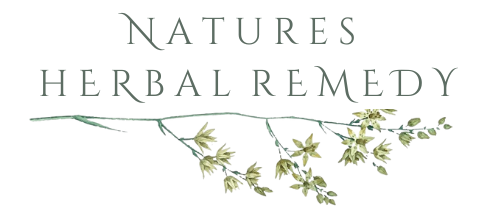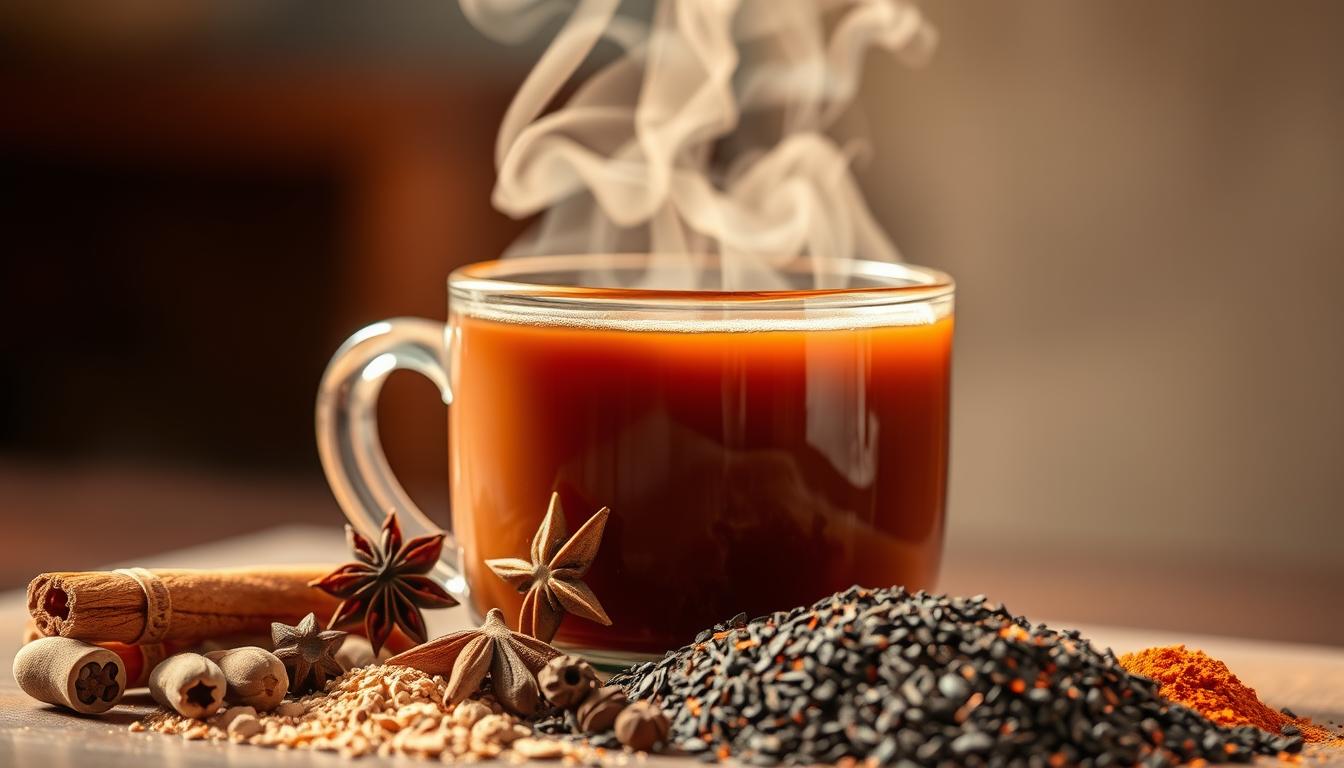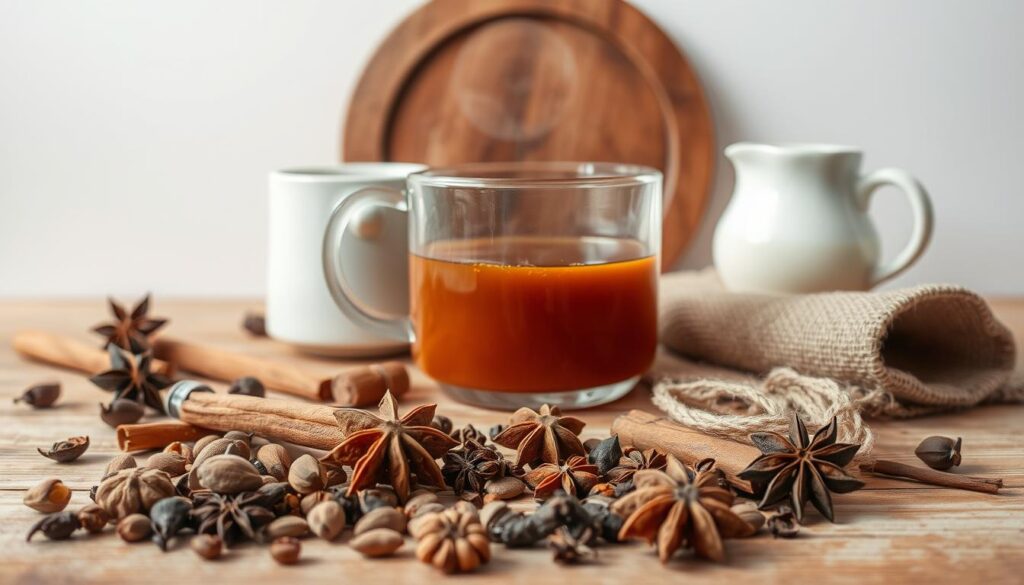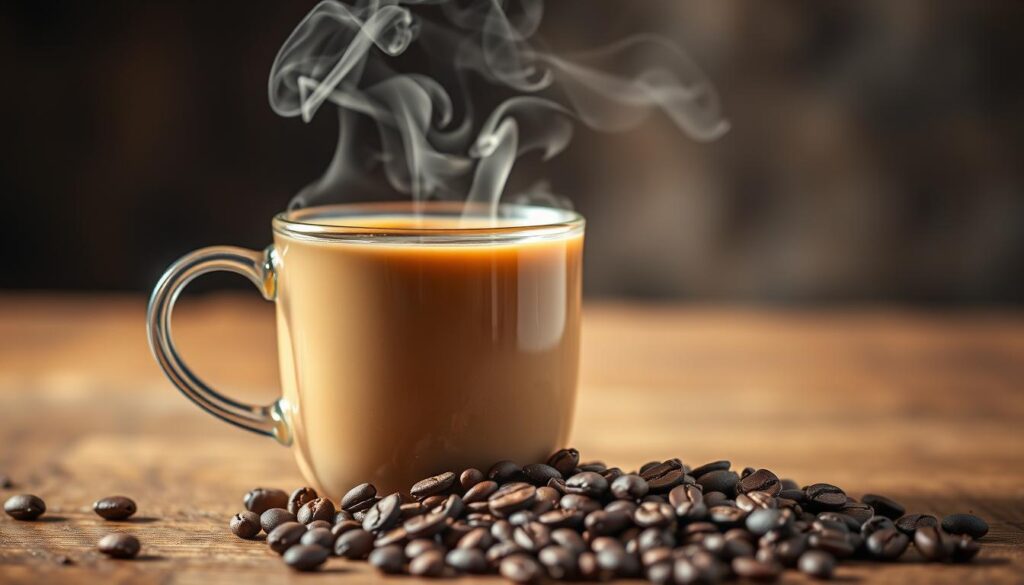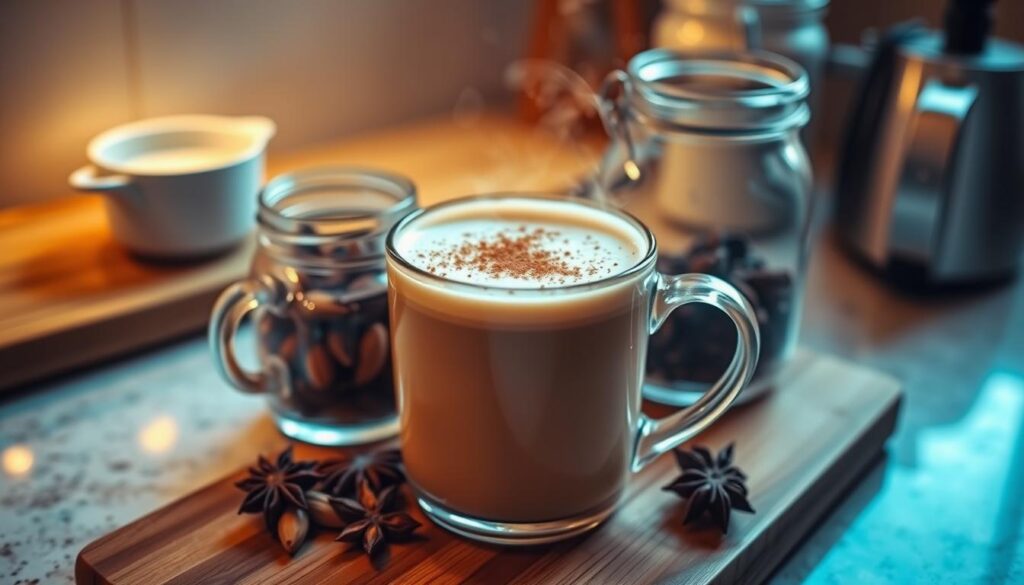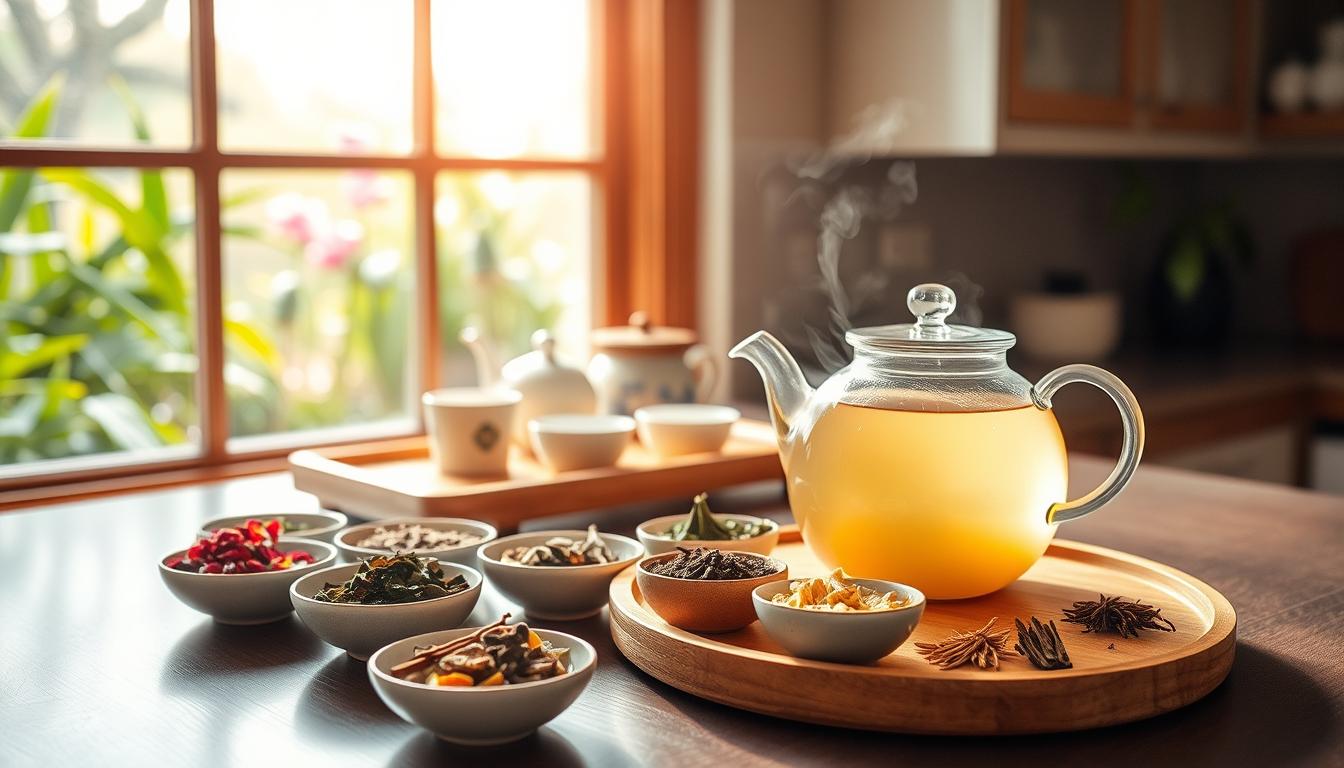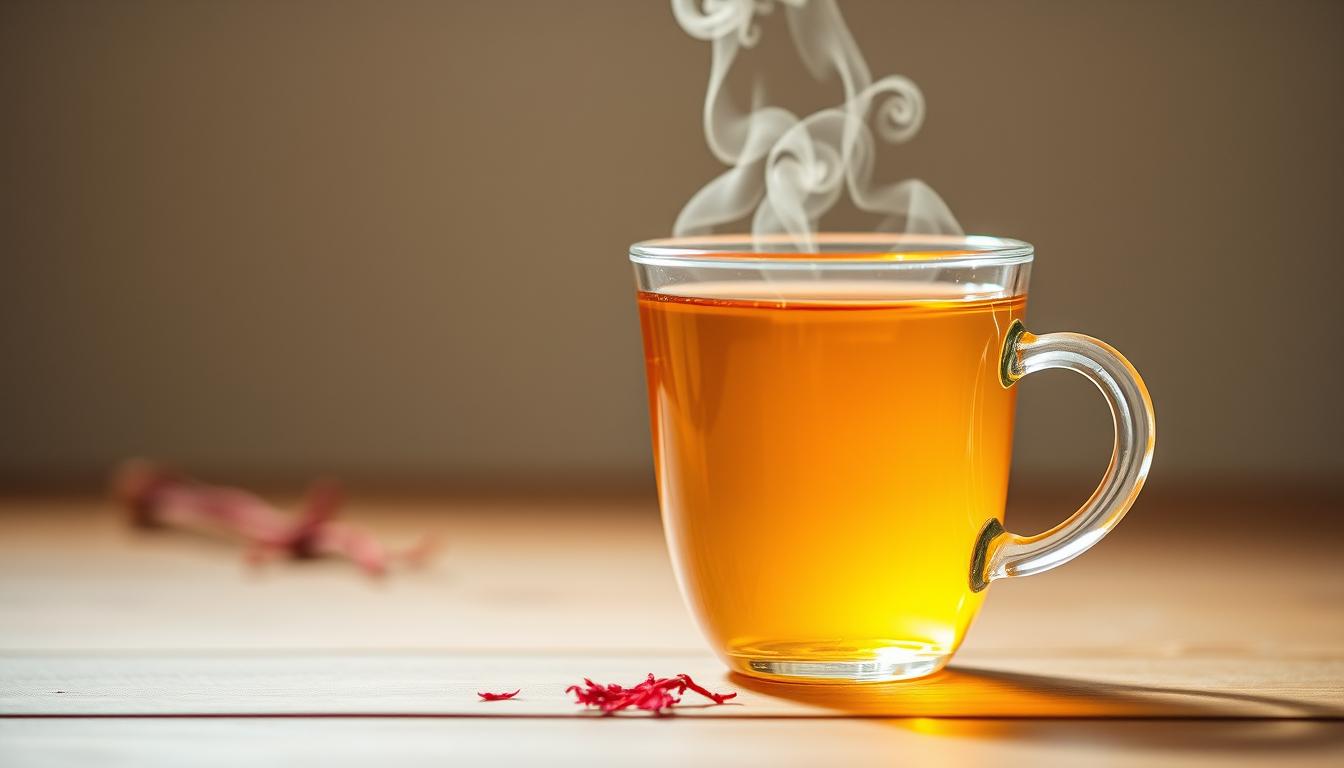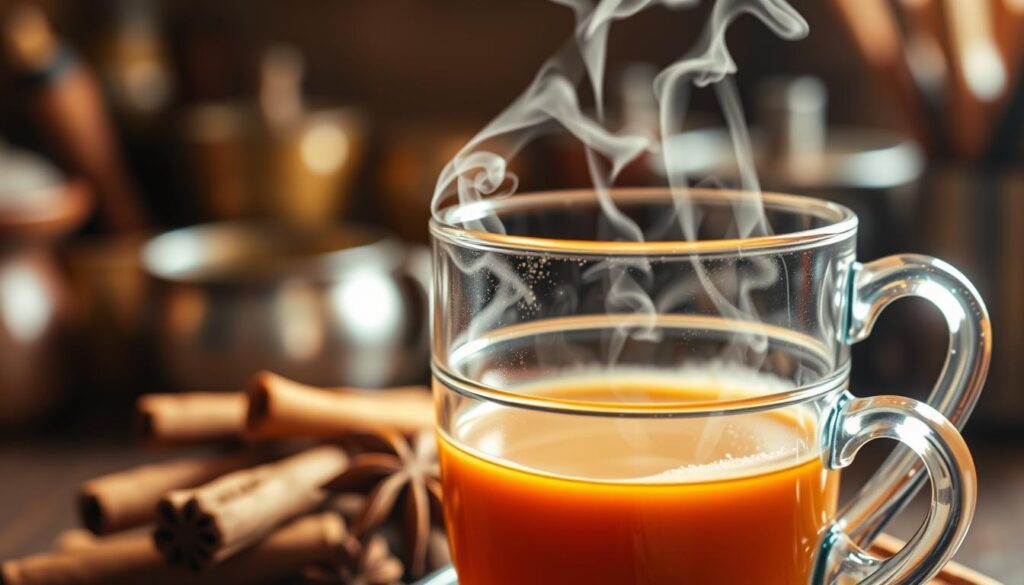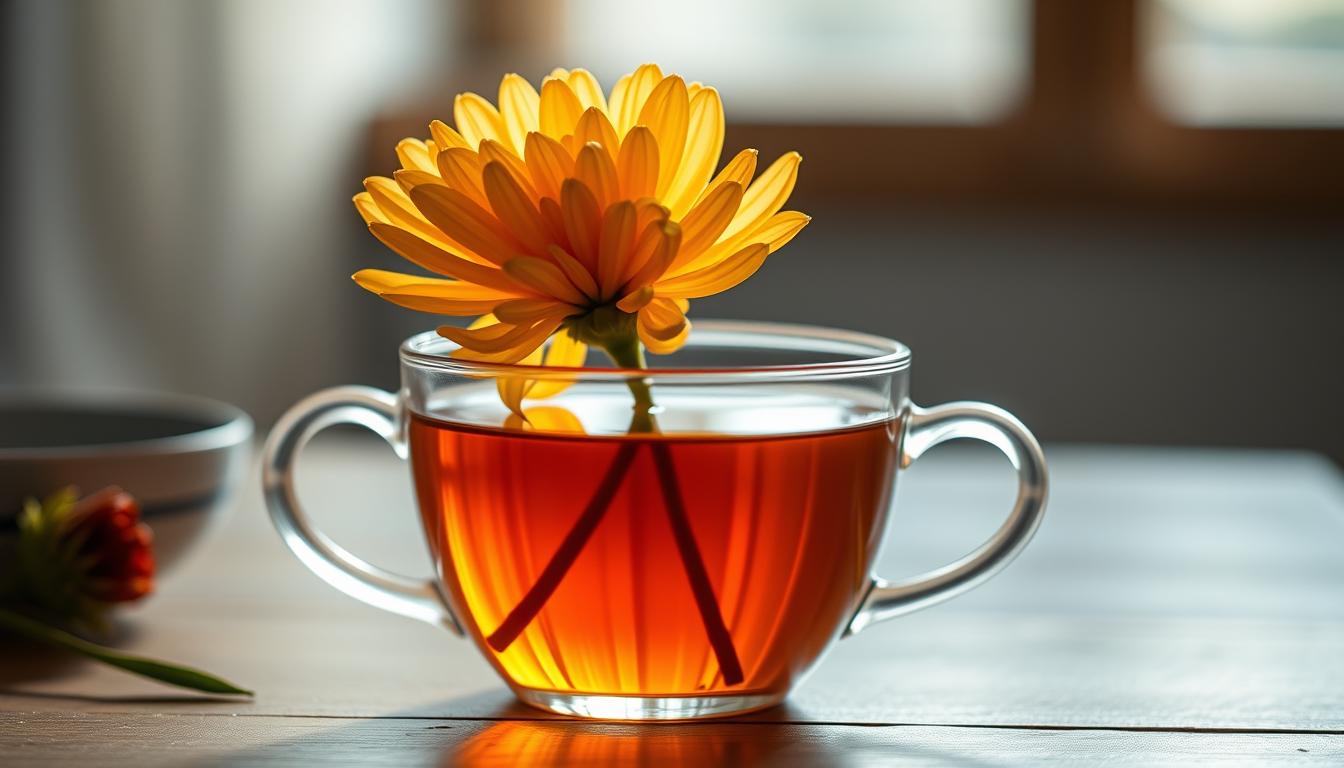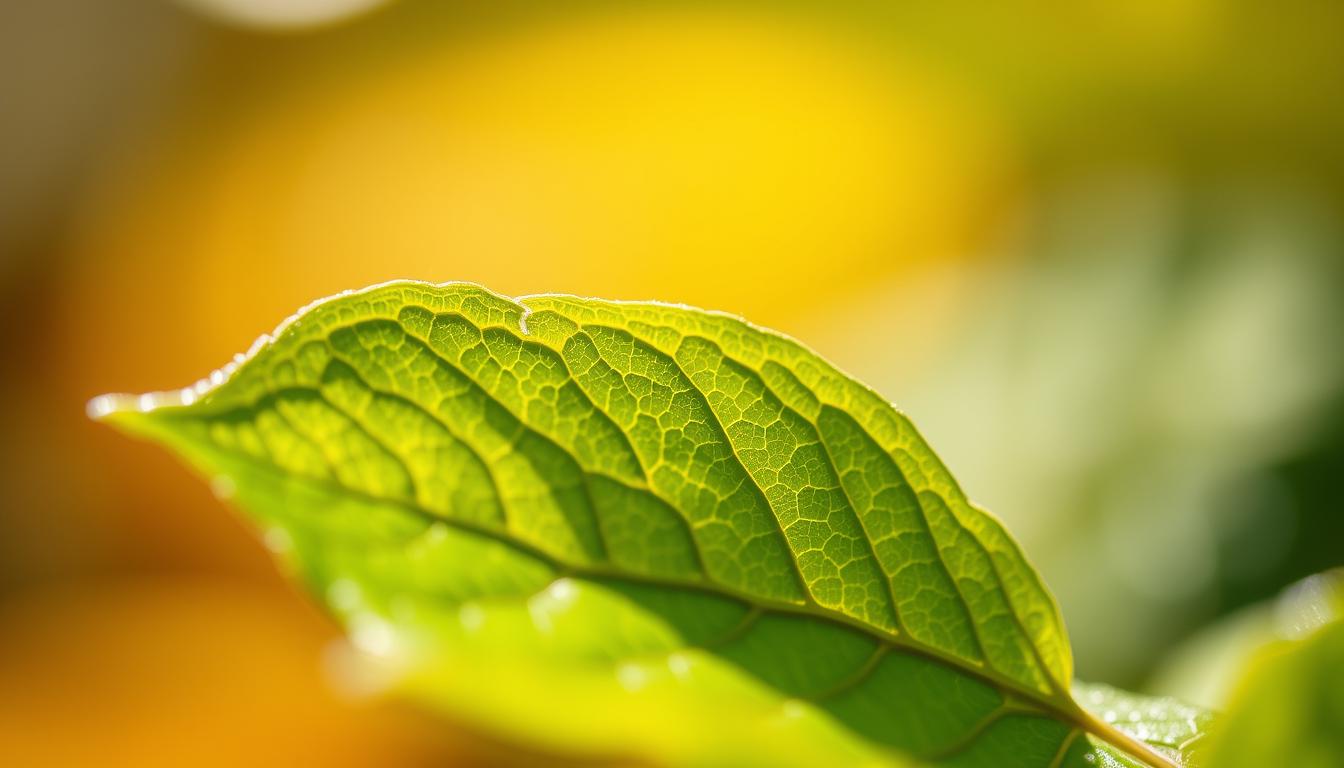Does Chai Have Caffeine? Chai Tea & Latte Guide (2025)
Does chai have caffeine? If you love tea, you’ve probably asked this question. The answer is yes, chai does have caffeine. But, the amount is usually less than you think.
Knowing how much caffeine is in your chai is important. It helps you decide how much to drink each day. This is true if you enjoy a calming tea experience or just want to know what you’re drinking.
When you dive into the world of chai, you’ll find the chai caffeine content varies. Knowing this helps you enjoy your chai while keeping an eye on your caffeine intake.
Table of Contents
What is Chai? Understanding the Popular Beverage
Have you heard of chai? Knowing its origins and ingredients can make you appreciate it more. Chai is a fragrant drink made from black tea, milk, and spices like cardamom, ginger, and cinnamon. It has a warm, sweet, and complex taste.
The Origins and History of Chai
Chai comes from India, where it’s been loved for centuries. It started as a traditional wellness drink but became a favorite beverage. Different areas in India have their own special chai recipes and ways to make it.
Traditional Ingredients in Chai
Traditional chai mixes black tea, milk, sugar, and spices. Spices like cinnamon, ginger, cardamom, cloves, and black pepper are common. The mix of these ingredients changes the taste and smell of the chai.
Modern Chai Variations
Chai has changed a lot, with new types and spice mixes. Now, you can find chai lattes in coffee shops, which are creamy and sweet. These changes have made chai popular all over the world, enjoyed in many ways.
Does Chai Have Caffeine? The Simple Answer
Wondering does chai have caffeine? The answer is yes, thanks to its main ingredients. Chai is a spiced tea made with black tea as its base.
The Source of Caffeine in Chai
The main source of caffeine in chai is the black tea. Black tea, the most common base for chai, naturally contains caffeine. The caffeine amount can change based on the tea brand and brewing time.
Black Tea as the Primary Caffeine Source
Black tea gives chai its strong flavor. An 8 oz cup of black tea can contain between 40-70 mg of caffeine. This amount can vary with brewing time and tea type.
How Spices Interact with Caffeine
The spices in chai, like cinnamon and ginger, don’t change the caffeine level. But, spices like anise can influence how caffeine is processed by your body. This might change how you feel the energizing effects of your chai.
| Component | Caffeine Content | Effect on Body |
|---|---|---|
| Black Tea | 40-70 mg per 8 oz cup | Helps you feel naturally awake |
| Spices (e.g., ginger, cinnamon) | No caffeine | Can influence how caffeine is processed |
If you enjoy the warming spices in chai, you might also love saffron tea, which offers a unique floral and earthy flavor profile with its own set of traditional benefits.
Caffeine Content in Different Types of Chai
Chai can have different amounts of caffeine, from traditional masala chai to instant mixes. Understanding the chai caffeine content in different types helps you choose how much caffeine you want.
Traditional Masala Chai
Traditional masala chai has 30-50mg of caffeine per serving. The amount of caffeine depends on how long it’s brewed and the tea to milk ratio.
Chai Lattes at Coffee Shops
Wondering how much caffeine in chai latte? Chai lattes at coffee shops can have 25–70 mg of caffeine. The caffeine in a chai latte varies based on brewing methods and the type of tea used by different coffee shops.
Does Chai Latte Have Caffeine?
Yes, chai lattes contain caffeine. If you’re wondering how much caffeine in chai latte, the answer typically ranges from 50-120mg per serving, with most standard sizes falling in the 70-95mg range. The exact amount depends on where you get it and how it’s prepared.
Unlike traditional chai tea, chai lattes are typically made with a concentrated tea base mixed with steamed milk, which can affect the overall caffeine content.
Note: Caffeine values may vary by location, recipe changes, and preparation methods. The ranges provided here are based on publicly available nutritional data and independent testing.
Average Caffeine Content in Chai Lattes
Understanding the caffeine in chai latte helps you make informed choices, especially if you’re monitoring your daily caffeine intake or looking for an alternative to coffee.
The complete range is 50-120mg per serving, depending on size and preparation. However, most chai lattes you’ll order fall in the 70-95mg range, which represents typical medium to large sizes at major coffee chains.
Here’s what influences the chai latte caffeine content:
- Serving size: Small (50mg) to Extra Large (120mg)
- Preparation method: Homemade (20-50mg) vs. commercial concentrate (50-120mg)
- Type of tea base: Fresh brewed tea vs. chai syrup
- Number of concentrate pumps: Each pump adds approximately 10-12mg
- Brewing strength: Steeping time and tea-to-milk ratio for homemade versions
Chai Latte Caffeine by Coffee Shop and Brand
Different coffee chains and brands have varying chai latte caffeine levels. Here’s a detailed breakdown based on official nutritional information:
Chai Latte Caffeine by Coffee Shop and Brand
Different coffee chains and brands have varying chai latte caffeine levels. Here’s a detailed breakdown based on official nutritional information:
| Coffee Shop/Brand | Size | Caffeine Content | Notes |
|---|---|---|---|
| Starbucks Chai Latte | Short (8oz) | 50mg | 2 pumps concentrate |
| Starbucks Chai Latte | Tall (12oz) | 70mg | 3 pumps concentrate |
| Starbucks Chai Latte | Grande (16oz) | 95mg | 4 pumps concentrate |
| Starbucks Chai Latte | Venti (20oz) | 120mg | 5 pumps concentrate |
| Dunkin’ Chai Latte | Small (10oz) | 70mg (est.) | Uses chai tea extract |
| Dunkin’ Chai Latte | Medium (14oz) | 105mg | Standard serving |
| Dunkin’ Chai Latte | Large (20oz) | 130mg (est.) | Based on medium ratio |
| Peet’s Coffee Chai Latte | Medium (16oz) | 60mg | Milder than Starbucks |
| Tim Hortons Chai Latte | Medium | 50mg | Lower caffeine option |
| Homemade Chai Latte | 8oz | 20–50mg | Fully controllable |
| Tazo Chai Concentrate | Per serving (1/4 cup) | 70mg | Retail brand |
| Oregon Chai Concentrate | Per serving | 50–55mg | Available in stores |
Sources: Starbucks, Dunkin’, Peet’s, Tazo and Oregon Chai official nutrition/product pages. Values may vary slightly by preparation and location.
Pro tip: At Starbucks, you can request fewer pumps of chai concentrate to reduce caffeine. Each pump contains approximately 10-12mg of caffeine, so asking for “half sweet” or reducing pumps by half can significantly lower your intake.
If you’re interested in learning more about different types of chai products, check out our comprehensive guide on chai concentrate options and recipes.
Does Iced Chai Latte Have Caffeine?
Yes, iced chai lattes contain the same amount of caffeine as hot versions. The temperature doesn’t affect caffeine content—it’s determined by the amount of tea concentrate or brewed tea used.
An iced chai latte typically contains:
- 50-120mg of caffeine depending on size and brand (same range as hot versions)
- 70-95mg for typical medium sizes at major coffee shops
- Same concentrate amount as hot versions, just served over ice
- May taste stronger initially but can dilute as ice melts
Many people prefer iced chai lattes in warmer months while still enjoying the energizing qualities. To learn more about the wellness benefits of chai, explore our guide on the benefits of chai tea for energy and wellness.
Dirty Chai Latte: Extra Caffeine Kick
A dirty chai latte combines traditional chai with a shot of espresso, significantly increasing the caffeine content. This popular variation is perfect for those who want the spiced flavor of chai with the bold kick of coffee.
| Drink Type | Caffeine Content | Best For |
|---|---|---|
| Regular Chai Latte | 70-95mg | Moderate energy boost |
| Dirty Chai Latte (1 shot) | 145-170mg | Morning wake-up |
| Double Dirty Chai (2 shots) | 220-245mg | Maximum caffeine |
| Iced Dirty Chai | 145-170mg | Summer energy boost |
A single espresso shot adds approximately 75mg of caffeine to your chai latte, making a dirty chai comparable to or stronger than a regular cup of coffee.
Chai Latte vs. Traditional Chai: Caffeine Differences
Understanding the difference between chai latte caffeine and traditional chai tea caffeine helps you choose the right option for your needs.
| Aspect | Traditional Chai | Chai Latte |
|---|---|---|
| Caffeine Content | 30-50mg per 8oz | 70-95mg typical (50-120mg full range) |
| Preparation | Freshly brewed tea + spices | Concentrate/syrup + steamed milk |
| Tea-to-Milk Ratio | Higher tea concentration | More milk, less tea by volume |
| Flavor Intensity | Stronger tea flavor | Creamier, milder |
| Caffeine Control | Easy to adjust brewing | Depends on pumps/concentrate amount |
Why the difference? Chai lattes at coffee shops typically use concentrated chai syrups that pack more tea per serving than traditionally brewed chai. However, the higher milk content can make the caffeine experience feel more gentle and sustained.
How to Control Caffeine in Your Chai Latte
If you prefer to manage your caffeine intake or want to enjoy chai latte later in the day, here are practical ways to adjust the chai latte caffeine content:
Making Low-Caffeine Chai Latte at Home
When making homemade chai latte, you have complete control over caffeine levels:
- Use decaf black tea: Reduces caffeine to less than 5mg per cup
- Shorten steeping time: Brew for 2-3 minutes instead of 5 minutes
- Use less tea: Use half the amount of tea leaves or one tea bag instead of two
- Increase milk ratio: More milk dilutes the tea concentration
- Try herbal chai blends: Rooibos-based chai has zero caffeine naturally
For more options on caffeine-free brewing, explore our guide on chai tea bags including decaf varieties.
Quick Homemade Chai Latte Recipe (Caffeine-Controlled)
Ingredients:
- 1-2 black tea bags (or decaf option)
- 1 cup water
- 1 cup milk (dairy or non-dairy)
- Chai spices: cinnamon, cardamom, ginger, cloves
- Sweetener of choice
Simple Method:
- Simmer water with spices for 3-5 minutes
- Add tea bags and steep for 2-4 minutes (shorter brewing time = less caffeine)
- Heat and froth milk separately
- Strain tea into cup, add milk, and sweeten to taste
This method gives you approximately 20-40mg of caffeine, significantly less than coffee shop versions.
Ordering Lower-Caffeine Chai Latte at Coffee Shops
At coffee shops, try these customizations:
- Request fewer pumps: Ask for “half sweet” or reduce pumps by 1-2 (saves ~10-25mg per pump)
- Order a smaller size: Tall (70mg) instead of Grande (95mg) at Starbucks
- Ask for decaf chai: Some shops offer decaf chai concentrate
- Mix half and half: Request half chai concentrate, half steamed milk with extra spices
Chai Latte vs. Other Popular Lattes: Caffeine Comparison
How does chai latte caffeine stack up against other popular latte drinks? Here’s a comprehensive comparison (based on 16oz servings):
| Latte Type | Caffeine (16oz) | Energy Feel | Best Time |
|---|---|---|---|
| Chai Latte | 70-95mg | Smooth, sustained | Morning or afternoon |
| Coffee Latte | 150mg | Quick, intense | Early morning |
| Matcha Latte | 70-80mg | Calm alertness | Anytime |
| Dirty Chai Latte | 145-170mg | Strong, long-lasting | Morning |
| London Fog (Earl Grey) | 40-50mg | Gentle lift | Afternoon |
| Golden Milk Latte | 0mg | No caffeine | Evening |
Key insight: Chai lattes provide moderate caffeine—more than herbal drinks but less than coffee, making them an ideal middle-ground option for those seeking balanced energy without feeling overstimulated.
Who Might Want to Monitor Chai Latte Intake
While chai lattes are generally a moderate-caffeine beverage, some people may choose to be more mindful of their consumption. The information provided here is for general knowledge and should not replace personalized advice from a qualified healthcare professional.
- Expecting mothers: Many wellness practitioners suggest keeping daily caffeine intake moderate during this time. It’s worth discussing your beverage choices with your healthcare provider to find what works best for you.
- Those who feel sensitive to caffeine: Some people notice that caffeine affects their rest or makes them feel jittery. If this sounds familiar, you might prefer lower-caffeine options or enjoy your chai earlier in the day.
- Evening relaxation: If you’re planning to wind down soon, you might want to choose a caffeine-free option to support your natural rest patterns.
- Younger individuals: Many families prefer lower-caffeine or caffeine-free options for children and teens.
- Those experiencing daily stress: If you’re feeling on edge or restless, you might find that moderating caffeine helps you feel more balanced.
- If you take regular supplements or prescriptions: Some substances can work differently when combined with caffeine. It’s worth mentioning your beverage habits during your next wellness visit if you’re on a regular regimen.
Remember, everyone’s body responds differently to caffeine. These are general considerations—listen to your body and reach out to a wellness professional if you have specific concerns.
Decaf and Caffeine-Free Chai Latte Options
For those who want to enjoy the delicious spiced flavor of chai latte without the caffeine, several excellent options exist:
Decaf Chai Latte: Made with decaf black tea, containing less than 5mg of caffeine per serving. This option preserves the rich flavor while removing 96-99% of the original caffeine.
Rooibos Chai Latte: A naturally caffeine-free alternative using South African rooibos (red bush) as the base. It provides the same warm, spicy chai experience with zero caffeine and beneficial plant nutrients.
Honeybush Chai Latte: Another caffeine-free herbal option with a naturally sweet, honey-like flavor that pairs beautifully with traditional chai spices.
These alternatives are perfect for evening enjoyment or for anyone who prefers to skip caffeine while still craving that comforting chai latte experience.
The Bottom Line on Chai Latte Caffeine
Chai lattes do contain caffeine, with a full range of 50-120mg per serving and most typical sizes containing 70-95mg—about half to two-thirds the amount in a comparable coffee latte.
The exact amount depends on:
- Where you buy it (coffee shop brand and location)
- Size of your drink (8oz small to 20oz extra large)
- Type and amount of tea concentrate or syrup used
- Whether it’s a regular or “dirty” chai (with espresso)
Whether you’re looking for a gentler alternative to coffee or simply exploring different beverage options, understanding how much caffeine in chai latte helps you make choices that align with your personal preferences and lifestyle.
Chai Tea Bags
Chai tea bags have a standard amount of tea and spices. This means they usually have 25-50mg of caffeine per serving.
Instant Chai Mixes
Instant chai mixes have the least caffeine, with 15-30mg per serving. They are made with a mix of tea and other ingredients, making them easy to use.
The type of chai you pick affects how much caffeine you get. Whether you like the taste of masala chai or prefer instant mixes, knowing the caffeine content helps you choose wisely.
“The key to enjoying chai is understanding its caffeine content and making informed choices.”
How Preparation Affects Chai’s Caffeine Content
The way you make your chai can change how much caffeine it has. Several things affect how much caffeine gets into your tea. These factors include brewing time, temperature, milk-to-tea ratio, and the type of tea base.
Brewing Time and Temperature
Brewing time and temperature are key to getting caffeine from tea leaves. Longer brewing times and higher temperatures mean more caffeine in your tea. For example, steeping chai for 5 minutes instead of 3 can increase caffeine. Using boiling water instead of cooler water also enhances caffeine release.
Milk-to-Tea Ratio
The milk-to-tea ratio affects how you experience the caffeine in your chai. Milk doesn’t reduce caffeine but can make it feel gentler by diluting it. You can adjust the milk-to-tea ratio to control caffeine intensity. For a stronger brew, use less milk and more tea.
Using Different Tea Bases
The type of tea base in chai also matters for caffeine content. Black tea, the usual choice, has a lot of caffeine. But, you can try other teas like green or white tea, which have less caffeine. Switching to green tea, for example, can make your chai less caffeinated but just as tasty.
| Tea Base | Average Caffeine Content |
|---|---|
| Black Tea | 40-70 mg per 8 oz cup |
| Green Tea | 25-30 mg per 8 oz cup |
| White Tea | 6-8 mg per 8 oz cup |
By tweaking these factors, you can make your chai just right for you. Whether you want a strong caffeine boost or a milder experience, you can adjust it.
Green tea isn’t the only alternative worth exploring. Matcha, a powdered form of green tea, offers a creamy texture and a smooth, steady energy feel. Learn how to make matcha at home for a refreshing morning ritual.
chai vs coffee differences: Comparing Caffeine Levels
If you love coffee, you might wonder about chai vs coffee caffeine levels. Chai and coffee have different caffeine amounts. This can affect your choice, whether you’re sensitive to caffeine or seeking a gentler energy boost.
Average Chai vs. Coffee
When comparing chai vs coffee caffeine, chai usually has less caffeine than coffee. An 8-ounce coffee cup has about 95 mg of caffeine. In contrast, an 8-ounce chai tea has 30-50 mg.
| Beverage | Average Caffeine Content (8 oz) |
|---|---|
| Coffee | 95 mg |
| Chai Tea | 30-50 mg |
Other herbal teas offer unique energy experiences too. Moringa tea, for instance, provides natural vitality without the caffeine, making it a popular choice for afternoon sipping.
Chai Latte vs. Coffee Latte
Chai lattes and coffee lattes have different caffeine levels. A chai latte has 40-70 mg of caffeine. Coffee lattes, with 60-120 mg or more, depend on the shots used.
Why Chai Provides a Different Energy Experience
Chai offers a unique energy experience because of its spices and black tea. The mix of black tea and warming spices gives chai a smoother, more balanced energy feel compared to coffee.
Decoding Caffeine Content in Commercial Chai Products
Choosing a chai latte can be tricky because of the many options out there. The brand you pick can greatly affect how much caffeine you get. Some brands have more caffeine, while others have less.
Reading Nutrition Labels
It’s key to read nutrition labels well. Look for how much caffeine is in each serving. Remember, serving sizes can differ between brands. If caffeine isn’t listed, check the ingredients for black tea or coffee.
Popular Chai Brands and Their Caffeine Content
Each brand has its own chai caffeine content. Here’s a look at some well-known brands:
| Brand | Caffeine Content per Serving |
|---|---|
| Starbucks Chai Latte | 95mg |
| Tazo Chai Tea Latte | 70mg |
| Teavana Chai Tea | 55mg |
Marketing Terms: “Strong” vs. Actual Caffeine Content
Watch out for terms like “strong” or “extra bold.” They don’t always mean more caffeine. These words might talk about the taste or the tea solids. Always check the label or ask the maker for caffeine info.
Caffeine-Free Chai Options
If you’re looking to enjoy chai without caffeine, you have several options. Decaffeinated chai uses black tea that has been processed to remove most of the caffeine, typically leaving less than 5mg per cup.
You can also find herbal chai blends made with rooibos or honeybush instead of black tea. These naturally caffeine-free alternatives still deliver the warm, spicy flavor you love, making them perfect for evening enjoyment or for those avoiding caffeine altogether.
Other naturally caffeine-free options include chamomile tea and lemon balm tea, both known for their gentle, soothing taste — perfect for winding down your day.
If you’re curious about traditional herbal beverages from around the world, explore our guide to Chinese herbal tea and discover centuries-old brewing traditions.
Conclusion
You now know that chai does have caffeine. The amount is usually moderate, making it a good choice instead of coffee. You can adjust your chai to fit your caffeine needs.
Chai has less caffeine than coffee, which is great for a gentle energy boost. Whether you like traditional masala chai or a chai latte, knowing the chai caffeine content helps you choose wisely.
Exploring different chai types and how they’re made lets you customize your experience. This way, you can enjoy chai while keeping your caffeine intake in check.
FAQ
Does chai contain caffeine?
Yes, chai has caffeine, mainly from the black tea. The chai caffeine content can change based on the tea type, brewing time, and milk ratio.
How much caffeine is in a typical cup of chai?
Chai’s caffeine can be between 25 to 70 milligrams per 8 oz. Traditional masala chai usually has about 40 milligrams per 8 oz.
Is chai more caffeinated than coffee?
No, generally not. When looking at chai vs coffee caffeine, coffee usually has more. An 8 oz coffee can have 60 to 200 milligrams, while chai has less.
How does the caffeine in chai compare to chai lattes at coffee shops?
The caffeine in chai latte at coffee shops can be 40 to 120 milligrams per serving. This can vary by brand and how it’s made. Some may be stronger than homemade chai.
Can I adjust the caffeine content in my homemade chai?
Yes, you can change the caffeine by adjusting brewing time, tea type, or milk ratio. Longer brewing and stronger tea increase caffeine.
Are there caffeine-free chai options available?
Yes, there are caffeine-free or decaf chai options. They’re made with decaffeinated tea or herbal teas that don’t have caffeine.
How do I know the caffeine content of commercial chai products?
Check the nutrition label or product description to find the chai caffeine content. Some brands list it, while others might need you to contact customer service.
What is the difference between “strong” chai and its caffeine content?
“Strong” chai might mean the flavor or tea concentration, not caffeine. Always check the caffeine content directly, not just by marketing terms.
How much caffeine is in a Starbucks chai latte?
The amount of caffeine in a Starbucks chai latte varies by size. A Grande (16oz) typically contains about 95mg, a Tall (12oz) has around 70mg, and a Venti (20oz) can reach up to 120mg.
Does iced chai latte have the same caffeine as hot?
Yes, iced chai lattes generally contain the same caffeine as their hot counterparts. Depending on the size and preparation method, caffeine content usually ranges from 50mg to 95mg. The temperature of the beverage does not affect its caffeine level.
What is a dirty chai latte and how much caffeine does it contain?
A dirty chai latte combines traditional chai with a shot of espresso. This results in higher caffeine content, typically between 115mg and 160mg, combining the chai’s 50-95mg with approximately 65-75mg from espresso for an added boost.
